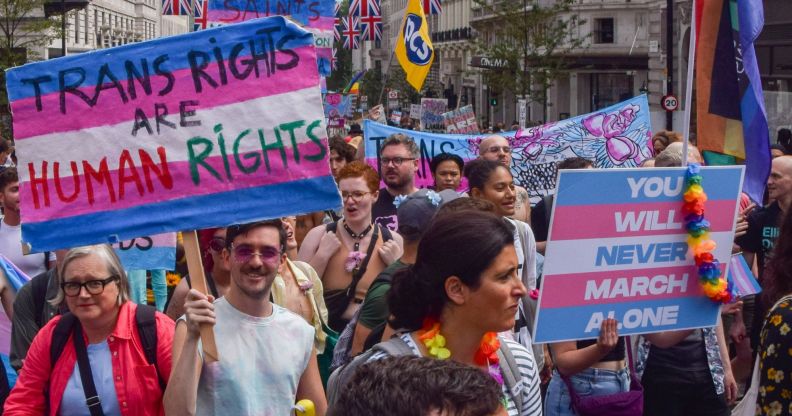Appeal against spiralling trans healthcare wait times argues NHS ‘breached legal duty’

The Court of Appeals heard arguments challenging a ruling made on NHS England wait times. (Getty)
The Court of Appeal has heard arguments challenging the “extreme” NHS wait times for gender-affirming care.
The hearing comes after the High Court rejected a judicial review against NHS England in January, bought by four trans people, trans-led charity Gendered Intelligence and the Good Law Project, on the grounds that the long wait times for gender-affirming care were unlawful.
Wait times for a first appointment at an NHS gender clinic are currently up to five years long – the NHS has a statutory requirement that at least 92 per cent of patients should have a referral-to-treatment time of no more than 18 weeks.
However, High Court judge Justice Chamberlain found that failure to “achieve that standard” is not a breach of the law.
On Tuesday (11 July), legal representatives argued to Court of Appeal judges that the original ruling didn’t take into consideration the duties of succinct care that NHS England (NHSE) must provide under its own laws.
Appellants argued that several parts of the NHS constitution, as well as subsequent laws put in place, framed the need for succinct wait times as a right rather than a pledge.
“Our case, of course, is that this is in fact a specific duty imposed through regulation-making powers that are designed to clothe what are target duties – the provisions of the NHS Act,” the court heard.
Good Law Project and trans claimant representative argues NHS England demands a level of ‘service quality’ in appeal.
The claimaints’ case was bought on grounds of breach of statutory regulation, breaching statutory duty, directly and indirectly discriminating against two of the claimants, and failing to comply with the 2010 Equality Act.
While the original ruling acknowledged that young trans people seeking gender-affirming care are protected by the 2010 Equality Act, it dismissed claims of breach, arguing that the clauses were not a right.
In their appeal, representatives argued that the NHS constitution not only frames these obligations as a right, but demands a level of “service quality.”
The Court of Appeal also heard arguments that the claim NHSE provisions were strained by the COVID-19 pandemic was also unfounded because “such an issue was anticipated as far back as 2010.”
“We can’t hide from [the impact of COVID-19] even though the statistics show that even before COVID, NHS England was in breach of its duty.
“An influenza epidemic was anticipated, and it was anticipated that if that occurred, it may be the case that the obligations in question were required to be suspended.”
The appellants also argued that, despite the shock of COVID-19 and the anticipation of such a health emergency, the law is still very clear on its obligations.
“If the real complaint is, ‘We can’t comply with this duty now in these changed circumstances’, the proper response to that is not to pretend that the law is other than it always has been but to change the law.
“What you can’t do is to pretend that a network of obligations clearly designed to confer legally enforceable rights is anything other than a hard-edged duty.”
It’s not clear when a judgement will be handed down.
‘Healthcare is a human right’
In a statement provided to PinkNews, the Good Law Project said that it hopes the appeal is able to improve NHSE wait times.
Head of engagement, Ellie Mae O’Hagan, said: “England is one of the worst countries in the developed world for transgender people to get the healthcare they need.
“We believe the extreme waiting times faced by trans people are not just immoral, they are unlawful. And that’s why we are proud to back this appeal
“This case was funded by thousands of ordinary people chipping in, showing that lots of members of the public agree that all of us should be able to get the care we need when we need it, whatever our gender.”
Eva Echo, one of the claimants on the case, added that healthcare is “a human right” and that she believed “nobody should have to suffer for years of waiting just to be able to live.”
“I’m relieved to hear that our Court of Appeal case will be going ahead. With the trans community under increased attack from all areas, we need to send a clear message that we will not stop fighting for them.

